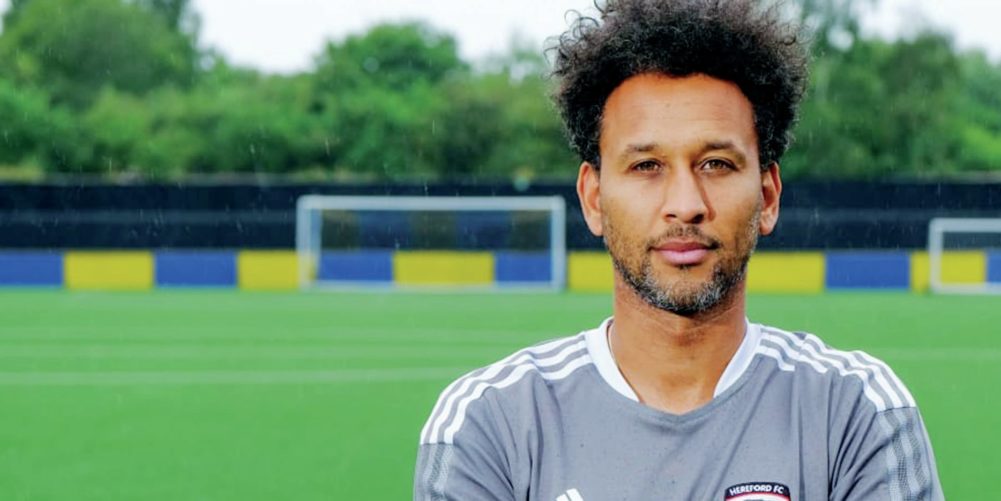Josh GOWLING
HEREFORD FC MANAGER
BLACK HISTORY Month, which ends today, is designed to celebrate black culture and heritage – but until we make fundamental changes regarding what we are taught in this country about black history, it’s largely going to be a waste of time.
I am mixed race – Mum is white British, and Dad was from Jamaica – and I’m proud to be the product of two different cultures.
In school, I learned in detail about my white heritage – kings, queens, the British Empire, and so on – but the only thing I was taught about black culture was slavery.
Thankfully I’ve since come to understand the important role black people played in the history of this country and the wider world.
Like when Christopher Columbus stumbled across America in the 15th Century, he saw Africans. So that meant Africans travelled the world. They had wealth, knowledge, understanding, astronomy. Schoolkids aren’t taught any of that.
We know the Windrush generation came to Britain from the West Indies after World War II to help rebuild the country. Yet in 2013 the then Education Secretary Michael Gove dropped any reference of it from the National Curriculum.
Schools teach about the abolition of slavery and how they were freed. Then what? Where did these people go? What did they do? We don’t learn how former slaves ran businesses, contributed in a big way to the economy, and some became very wealthy.
I was never told any of this at school and, to truly know who I am, my history and my background, I had to educate myself through reading as I got older. That makes me feel sad.
For black people to have respect for themselves, and other cultures to have respect for black people, we all need to properly understand black culture. If everyone is taught only that black culture is based on slavery or owned by white society, then how is respect meant to be built?
So, when we talk about unconscious bias black people still face, is it any wonder? And that’s a big problem.
As a country, we are more diverse than ever. A lot of people just see others for what they are and believe there’s no issue. So, when we talk about unconscious bias, they perhaps don’t get it. They just see me as me. But that doesn’t mean it doesn’t exist.
As an example, while I was driving my assistant Steve Burr to training, we were discussing white privilege and how black people might experience life compared to a white person.
Flashlights
I explained how I’ve been in shops and followed around by security guards. Last year I was pulled over by police three or four times. I’ve had flashlights shone in my face and accusatory questions asked of me.
Then one day Steve and I were together when I was pulled over and he saw it for himself. The officers asked where I was from and if the car was in my name. Then they let me go on my way. I said, ‘See?’ Steve, a great guy who treats everyone the same, couldn’t believe it – but now he does.
We see these same unconscious biases in football. I heard a radio interview where someone said, ‘Maybe black footballers just don’t make good managers or coaches’.
Why would a white manager be any different from a black manager? Do we not think the same? Do we not have the same intelligence? Or am I not as intelligent purely based on my skin colour?
■ ANYONE who has seen our recent National League North games will say we shouldn’t be where we are in the table.
We’ve controlled most games. But at key moments in both boxes we’ve switched off defensively or not committed as many as we should when attacking.
I know where we are going to be at the end of the season. And, speaking to other managers after games who praise the way we are playing, so do they.
Seven teams have lost five games this season and another eight have lost four. Our issue is, while we’ve only lost four, we’ve drawn four as well.
Turning those into wins will make the table look rather different.
I can’t say that in my first couple of years as a manager I have experienced racism – certainly not yet, anyway. The first job I went for, I got. And I will be eternally grateful to the good people at Hereford FC for that.
The board understood my credentials and what I would bring to the club. They employed me for being me. That’s fantastic, and how it should be. But the distinct lack of Black managers – there are only a handful, including me, in the professional ranks – suggests that cannot be the case at every single club across the country.

Investigating
Education cannot begin and end in school. We are investigating an alleged racist incident at our game against Alfreton last week. If we find the perpetrator, I don’t just want to simply ban them – because that doesn’t solve anything. I want to speak to them. I want them to face my squad and explain their words.
If someone is banned for saying something racist, they are still going to have those thoughts – and it might even harden their racist views, because now they can’t do what they love which is watch football, in their mind at least, due to a black person. No, they need to be educated, to understand the gravity of their actions.
I’m pleased to say there has been some positive change in recent years. Dad put up with far worse than the things I put up with now.
But the unconscious bias remains.
If we want to change the narrative, the disparity, the perception of cultures, and this unconscious bias, then we need to start properly educating people about black history.
It feels like the anti-racism work we’re doing both in football and wider British society is superficial. Until we get to the root, we will always continue to face the same problem.
FOLLOW JOSH ON INSTAGRAM @JOSHGOWLING






















